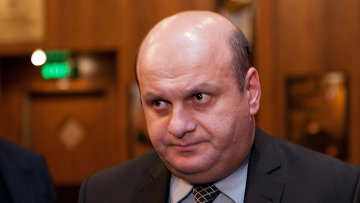
Fraying Georgian Government in Denial as Currency Spirals Downward
Publication: Eurasia Daily Monitor Volume: 11 Issue: 220
By:

On December 5, Georgia’s national currency, the lari, fell by another 2.86 percentage points against the US dollar, hitting its lowest point since spring 2004. Overall, from early November 2014, the lari depreciated by 11.2 percent, quickly sending the prices of everyday products and commodities upwards (Channel 1 TV; Rustavi 2, December 5).
Currency fluctuations are a normal occurrence, but not on this scale. What is more, the Georgian government appears to fail to grasp its destructive potential on the economy and on its own grip on power. In fact, the government is in total denial that the problem exists at all. The National Bank of Georgia called the accelerating pace of inflation “short-term fluctuation” (Imedi TV, December 5). Astonishingly, Finance Minister Nodar Khaduri actually declared that commodity prices not only did not rise, but declined (Infocaucasus, December 5). Furthermore, Prime Minister Irakli Garibashvili blamed Georgian media for “artificially straining the situation” around the lari’s depreciation (Channel 1 TV, December 5).
In fact, however, the prices of some food products have risen by 20–30 percent or more—all within a period of only several weeks. And as regular Georgians begin to feel the ever wider impact of the deepening inflation, voices of discontent and frustration can be heard increasingly often (Imedi TV; Rustavi 2, December 1–5).
It is difficult pinpoint exactly what caused this latest bout of the deprecation of the Georgian lari. The National Bank of Georgia has blamed the strengthening US dollar, a slowdown in external financing, and an overreaction of market participants (Civil Georgia, December 5). The related question is what the government will do to alleviate the problem, especially considering the fact that it refuses to acknowledge the problem’s existence in the first place and has yet to present any kind of coherent policy to address the issue. Meanwhile, the worsening inflation can quickly wipe out the already impoverished population’s meager savings, sending these Georgians deeper into poverty. If the economic situation continues to deteriorate, the frustrated population could certainly come out onto the streets and demand to sweep away the current authorities.
However, the government’s troubles do not end with the country’s ongoing socio-economic problems. On December 5, Zviad Jankharashvili, the executive secretary of the ruling Georgian Dream Party and a relative of Prime Minister Garibashvili, resigned from his post (Tabula.ge, December 5). On the same day, several other high-ranking government officials resigned, including the governor of Guria region, the Head of the Ministry of Interior’s Internal Investigations Unit, and the Chief of the Department of Government Relations with the Regions. They all were implicated in unspecified corrupt activities (Rustavi 2, December 7).
Some observers have speculated that former Prime Minister Bidzina Ivanishvili, who is believed to be disappointed with the current government’s performance, is behind these changes. Ivanishvili, however, denied that he was unhappy with the authorities’ work, emphasizing that the “government works well” (Civil Georgia, December 6). Refuting that he was behind these changes, however, will be much harder for Ivanishvili. After the latest government shake up, Nodar Javakhishvili, the head of the Ivanishvili-owned Cartu Bank, has been appointed Deputy Minister of Infrastructure and Regional Development (Imedi TV, December 6). This should not be seen as a coincidence. Rather, Ivanishvili is apparently trying to tighten his slipping grip on the government, which has been shaken by the recent inflation as well as incompetence and rampant nepotism, all taking place under Prime Minister Garibashvili’s watch. Moreover, Ivanishvili’s claim that he supports the government’s work does not seem sincere. In fact, he may be experiencing a rift with his protégé Garibashvili. On one occasion last month, Ivanishvili even referred to Garibashvili as an “immature individual” (Channel 1 TV, November 8).
Another manifestation of the growing chaos within the government was yet another round of the deepening political standoff between President Giorgi Margvelashvili, on the one hand, and the parliament and the cabinet on the other. President Margvelashvili vetoed the government-sponsored bill on regulating domestic surveillance, instead proposing his own bill. The ensuing political wrangling lasted for more than a month before the parliament finally overrode the presidential veto on November 30 (Civil Georgia, November 30).
During its two-year rule, the Georgian government has muddled through a long string of smaller crises. But the current rising inflation and growing fragmentation within the government indicate that, in the coming months, the Georgian Dream–led cabinet might be approaching a point where it will need to struggle for its own survival. So far, however, there is little to indicate that Garibashvili and his ministers truly comprehend the scale of the looming troubles ahead.




